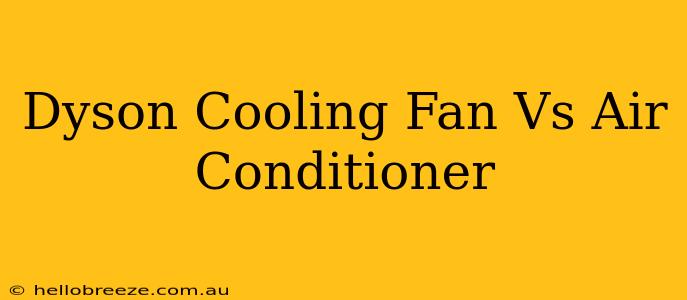Summer heat can be brutal, leaving you searching for relief. Two popular choices often top the list: Dyson cooling fans and air conditioners. But which one reigns supreme? The answer, as with most things, depends on your individual needs and preferences. This comprehensive guide will help you decide whether a Dyson fan or an air conditioner is the best fit for your home and budget.
Understanding the Differences: Dyson Fans vs. Air Conditioners
The core difference lies in how they work. Air conditioners actively cool the air by removing heat from a space. They use a refrigerant cycle to absorb heat and release it outside, significantly lowering the room temperature. This makes them ideal for hot and humid climates.
Dyson cooling fans, on the other hand, circulate existing air. While they don't actively cool the air like an air conditioner, many models feature advanced technology like Air Multiplier™ technology to create a powerful, consistent airflow, which can make you feel cooler. This makes them a good choice for mildly warm days or as a supplemental cooling method.
Dyson Cooling Fan Advantages:
- Energy Efficiency: Dyson fans generally consume less energy than air conditioners, leading to lower electricity bills. This is especially significant during prolonged periods of heat.
- Portability: Dyson fans are typically more portable than air conditioners, allowing you to easily move them from room to room.
- Quiet Operation: Many Dyson fans are designed with quiet operation in mind, making them suitable for bedrooms and other quiet spaces.
- Aesthetic Appeal: Dyson fans often boast a sleek, modern design that complements various interior styles.
- Multiple Modes and Features: Advanced models offer different airflow settings, oscillation options, and even sleep timers for enhanced comfort and convenience.
Air Conditioner Advantages:
- Effective Cooling: Air conditioners drastically lower room temperature, providing significant relief in extremely hot and humid conditions. This is crucial for comfort and health, especially for those sensitive to heat.
- Humidity Control: Many air conditioners dehumidify the air, which can significantly improve comfort levels, especially in humid climates.
- Improved Air Quality: Some air conditioners come with air filtration systems, removing dust, pollen, and other allergens from the air.
Dyson Cooling Fan Disadvantages:
- Limited Cooling Power: Dyson fans do not lower room temperature significantly; they primarily circulate existing air. They won't provide substantial cooling relief in extreme heat.
- Not Ideal for Humid Climates: In very humid environments, a Dyson fan alone might not provide sufficient comfort. The circulating air might feel warm and sticky.
Air Conditioner Disadvantages:
- Higher Energy Consumption: Air conditioners use considerably more energy than fans, resulting in higher electricity bills.
- Installation and Maintenance: Air conditioners often require professional installation and regular maintenance, adding to the overall cost.
- Noise: Some air conditioners can be quite noisy, particularly older models.
- Space Consumption: Air conditioners take up more space than fans.
Which is Best for You?
The best choice depends on your specific needs:
-
Choose a Dyson cooling fan if:
- You live in a climate with mild summers.
- You need a portable and energy-efficient cooling solution.
- You're on a budget.
- You prioritize quiet operation and aesthetics.
-
Choose an air conditioner if:
- You live in a hot and humid climate.
- You need significant temperature reduction.
- You require humidity control.
- Air quality is a major concern.
Ultimately, the decision hinges on your climate, budget, and personal preferences. Carefully weigh the advantages and disadvantages of each option before making a purchase. You might even consider a combination of both for optimal cooling during different seasons and weather conditions.

